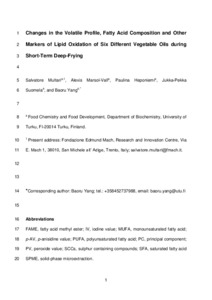Changes in the volatile profile, fatty acid composition and other markers of lipid oxidation of six different vegetable oils during short-term deep-frying
Salvatore Multari; Alexis Marsol-Vall; Paulina Heponiemi; Jukka-Pekka Suomela; Baoru Yang
https://urn.fi/URN:NBN:fi-fe2021042822997
Tiivistelmä
Oil deterioration during deep-frying influences the quality of fried foods to a great extent. In this study, the frying performance of six vegetable oils, i.e., hemp, lupin, oat, rapeseed, soy, and sunflower, was evaluated following short-term (60 min) deep-frying of French fries at 180 °C. The frying oils were investigated for fatty acid profile, volatile compound composition, and parameters of oxidative stability, such as iodine, peroxide, and p-anisidine values. The examination showed that the content of ƩPUFA in hemp oil decreased significantly (p < 0.05) after 60 min of deep-frying, although the degree of change was relatively small (close to 1.5%). Similarly, soy oil presented a fatty acid profile prone to oxidation, and generated the highest level of peroxides at the end of the thermal treatment (PV = 16.6 ± 2.3 mEq O2 kg−1). As for the volatile compound composition of the oils, sunflower oil was extensively affected by the deep-frying treatment with a significant decrease (p > 0.05) in total terpenes, accompanied by a considerable rise in total aldehydes. Oppositely, the proportions of MUFA and PUFA of lupin and oat oils remained stable (p > 0.05) during the short-term deep-frying, indicating high stability of these oils. The research provided new data for evaluating the suitability of these oils for household food preparations.
Kokoelmat
- Rinnakkaistallenteet [29335]
